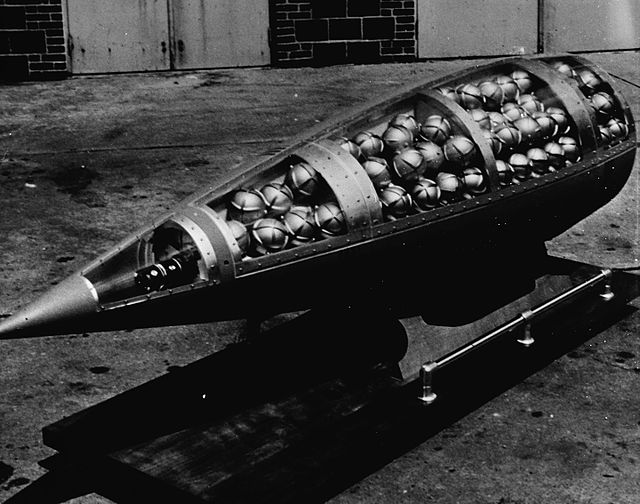Nerve agent
class of organophosphates; classified as weapons of mass destruction From Wikipedia, the free encyclopedia
Nerve gas or nerve agent is the name of a family of chemical poisons. Usually people call them nerve agents (they are not always gases). They work by changing the way the nerves work in the human body. They stop messages (signals) from the brain from getting sent to the muscles and organs.
Nerve agents are organic chemicals that have phosphorus in them (organophosphates). Many organophosphates are pesticides, and have the same effects as nerve agents if people are exposed to them. However, these pesticides are not used against people as weapons like nerve agents are.[1]
Since they are chemical weapons, nerve agents are classified as weapons of mass destruction by the United Nations according to UN Resolution 687. Since 1993, making or stockpiling them has been against international law.[2]
Nerve agents have long-lasting effects. People who survive nerve agent poisoning almost always have chronic damage to the brain and nerves. This damage can also cause mental health problems.[3]
How they work
Nerve agents work by blocking communication between the brain and the body. Usually, a neurotransmitter (a chemical messenger) called acetylcholine gives the signal for the muscles to tighten up. It also keeps them from relaxing. However, when it is time for the muscles to relax, an enzyme called acetylcholinesterase destroys acetylcholine, and another neurotransmitter tells the muscles to relax.[4]
Nerve agents work by blocking acetyl-cholinesterase. Too much acetylcholine builds up, because it is not getting destroyed by acetylcholinesterase. The muscles keep getting more and more signals to tighten up. Basically, the brain loses control over the body's muscles. It cannot make the muscles relax. This leads to many of the unique signs and symptoms of nerve agent poisoning.[5]
Acetylcholine also signals the parasympathetic nervous system (PNS) to kick in. Usually, the PNS balances out with the sympathetic nervous system to maintain homeostasis. However, when there is too much acetylcholine, the two systems cannot balance, and the sympathetic nervous system does not work correctly.[5]
Symptoms
Nerve agent poisoning causes a very unique group of signs and symptoms. Some medical providers use the acronym "SLUDGE" to remember them:[6][7]
- Salivation: The salivary glands make a very large amount of saliva (spit); the person will drool a lot
- Lacrimation: Tears will run out of the person's eyes
- Urination: As the brain loses control over the body's muscles, the person will involuntarily urinate
- Defecation: For the same reason, the person will also involuntarily defecate
- Gastric upset: The person will have an upset stomach
- Emesis: The person will vomit
Some medical professionals use a different version of this acronym: "SLUDGE and the Killer B's." The Killer B's are three life-threatening symptoms:[7]
- Bradycardia: Slow heart rate (caused by over-activity in the parasympathetic nervous system)
- Bronchoconstriction: The bronchi (tubes to the lungs) get narrower, as the muscles around the airways tighten up
- Bronchorrhea: Making more than 100mL of mucus per day. This can build up in the lungs or make the lungs be unable to inflate normally[8]
As the person gets worse, they will have muscle twitches, then start having seizures and go into status epilepticus. People can die because their brain cannot control their breathing muscles, and they stop breathing.
Commonly known nerve agents

"G series" nerve gases
These nerve gases are called "G series" because they were first created by German scientists. They were all discovered and made before or during World War II.[9]
"V series" nerve gases
Nobody agrees on why these nerve gases are called "V series." Different people say the V stands for "Victory," "Venomous" (poisonous), or "Viscous" (thick liquid).[9]
- The most commonly known "V series" nerve gas, VX, was made in the 1950s by the United Kingdom's military researchers.[9]
International law
There have been two major international laws that relate to nerve agents:
- Hague Convention of 1899: This was the first agreement that made it illegal to use toxic gas as a weapon (in section IV,2.)[10]
- Geneva Protocol of 1925: This agreement was signed on June 17, 1925, and took effect on February 8, 1928. It permanently bans the use of all forms of chemical and biological warfare.[11] The agreement was signed after World War I, where mustard gas and other chemical weapons were used. People were afraid that chemical and biological warfare could have terrible effects in any future war. The protocol was extended by the Biological Weapons Convention (1972) and the Chemical Weapons Convention (1993).
Related pages
References
Wikiwand - on
Seamless Wikipedia browsing. On steroids.